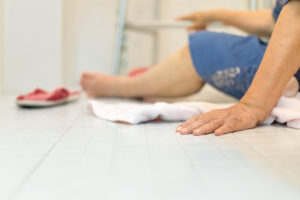One-Third of Seniors 65+ Involved in Slip and Fall Accidents
 A slip and fall accident can be very scary for anyone, but for seniors, the health risks associated with this type of accident can include extreme pain, disability, and even death. According to the Center for Disease Control and Prevention, one-third of the population over the age of 65 falls each year. Those with dementia fall 60 percent more often than those without the disease. These types of accidents cause the deaths of almost 10,000 older Americans annually. Therefore, it is vitally important that seniors and those who care for them are aware of the risks and prevention steps when it comes to slip and fall accidents.
A slip and fall accident can be very scary for anyone, but for seniors, the health risks associated with this type of accident can include extreme pain, disability, and even death. According to the Center for Disease Control and Prevention, one-third of the population over the age of 65 falls each year. Those with dementia fall 60 percent more often than those without the disease. These types of accidents cause the deaths of almost 10,000 older Americans annually. Therefore, it is vitally important that seniors and those who care for them are aware of the risks and prevention steps when it comes to slip and fall accidents.
Mental Stress from Slip and Fall Accidents
The risks associated with slip and fall accidents aren’t just physical. Statistics show that at 80-years-old more than half of seniors will fall potentially causing a life-altering medical condition such as a hip fracture. Additional health risks associated with falls can be less obvious.
Seniors may suffer from depression or social isolation if they have experienced a fall and are insecure about falling again. Likewise, the mental strain of such accidents can cause some seniors to feel as though they have lost their independence and mobility. However, there are certain fall prevention steps to take in order to provide peace-of-mind to your elderly loved one.
Steps to Prevent Slip & Fall Accidents
- Take note of home environment. Some slip and fall accidents can be prevented by simply being aware of the home environment and correcting potential hazards. For example, make sure that carpets and rugs are not obstacles for your loved one when walking around the home and pick up pieces of garbage or toys that may be lying around on the floor. Providing a safe walking space for your loved one is a simple, yet important step in accident prevention.
- Check eyesight and be aware of other health issues. There are certain health conditions that may contribute to a higher risk for a fall. Failing eyesight is one of the issues that may cause seniors to not be completely aware of their surroundings. It’s important to help your loved one get their eyes checked and use the appropriate eyewear if necessary. Regular medical checks are key to ensuring that you and your elderly loved one are aware of any medical conditions that may make mobility more difficult.
- Monitor Medications. Certain medications may cause seniors to become dizzy or disoriented. It’s important to ensure that your loved one and/or his/her caretaker is aware of the side effects of any required medication. Understanding the ways that medication may affect your loved one can help you protect them against a potential accident at home or away.
If your loved one lives alone and is at risk for a slip or fall, it may be more comforting to both you and him/her to have a caregiver present in the home. In the event of a slip or fall accident, caregivers and nurses can provide immediate support and assistance in order to ensure that proper medical attention is received.
An in-home caregiver can also provide peace-of-mind in the aftermath of a slip and fall accident by helping with rehabilitation, proper dispensing of medication, cooking, cleaning, and even companionship. If you are interested in learning more about our in-home services for your elderly or disabled loved one, please contact us to schedule a complimentary consultation.
References:
Seniors and Falls: Statistics and Prevention. (n.d.). Retrieved February 23, 2017, from http://www.comfortkeepers.com/home/info-center/senior-independent-living/seniors-and-falls-statistics-and-prevention
Avoiding Slips & Trips for Falls Prevention Day. (n.d.). Retrieved February 23, 2017, from http://www.alzheimersweekly.com/2014/09/avoiding-slips-trips-for-falls.html
Slip & Fall Accidents | Fall Prevention Aging in Place. (2014, August 22). Retrieved February 23, 2017, from http://ageinplace.com/elderly-health/elderly-slip-fall-accidents/



